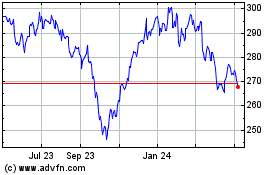McDonald's to Trim Antibiotics From Its Beef -- 2nd Update
December 11 2018 - 6:19PM
Dow Jones News
By Julie Jargon
McDonald's Corp. plans to reduce the use of antibiotics in its
global beef supply in the next few years, a tougher task than
removing their use from other types of meat.
The Chicago-based company said Tuesday that it will take two
years to decide how much of the antibiotics important to human
health it will be able to remove from beef. McDonald's said it
would work with meat suppliers in its 10 largest beef-sourcing
markets, including the U.S.
McDonald's and many other fast-food chains already have
eliminated the use of such antibiotics in chicken in the U.S., and
McDonald's is aiming to do so in other markets around the
world.
Reducing the use of such antibiotics in beef has been more
difficult for McDonald's, because of the company's scale and the
smaller number of suppliers that produce beef without the
medicine.
Cattle live longer than chickens, increasing their chances of
getting sick and needing antibiotic treatment. According to the
Natural Resources Defense Council, 43% of the medically important
antibiotics sold to the U.S. livestock sector go to the beef
industry, compared with only 6% for chicken.
Wendy's Co., which said it uses beef from younger and healthier
cattle, said Tuesday that it sourced nearly 20% of its beef this
year from a group of producers that have each committed to a 20%
reduction in antibiotics fed to their cattle.
Other restaurant companies including Chipotle Mexican Grill
Inc., Panera Bread Co. and Doctor's Associates Inc.'s Subway chain
also have either reduced antibiotics used in beef or committed to
do so.
The World Health Organization has said that antibiotic
resistance is one of the biggest threats to human health globally.
Consumer advocacy groups lauded the McDonald's move, saying that as
the largest U.S. beef purchaser, McDonald's will force the industry
to change.
Since Steve Easterbrook became chief executive nearly four years
ago, McDonald's has been making a number of changes aimed at
becoming what it calls a "better McDonald's." Earlier this year,
the company said it was removing artificial ingredients from the
buns, cheese and sauce on its best-known hamburgers in the U.S. It
also began making quarter-pound burgers with fresh, rather than
frozen, beef in the U.S.
Fast-food chains are battling for market share as consumers'
dining options grow. McDonald's has been struggling to attract more
customers to its U.S. restaurants. The company has been remodeling
restaurants, while trying to improve the quality of its food and
remain price-competitive with rivals. It is also rolling out more
premium-priced products, including customizable burgers. A group of
McDonald's franchisees in the U.S. has been discussing forming an
independent association to discuss ways to boost the company's
profitability. The chain posted third-quarter U.S. sales growth in
line with expectations by charging more for its food.
Write to Julie Jargon at julie.jargon@wsj.com
(END) Dow Jones Newswires
December 11, 2018 18:04 ET (23:04 GMT)
Copyright (c) 2018 Dow Jones & Company, Inc.
McDonalds (NYSE:MCD)
Historical Stock Chart
From Mar 2024 to Apr 2024

McDonalds (NYSE:MCD)
Historical Stock Chart
From Apr 2023 to Apr 2024
